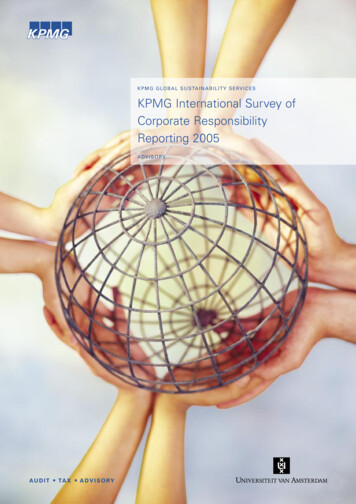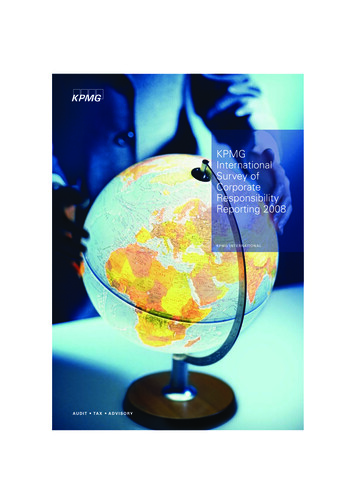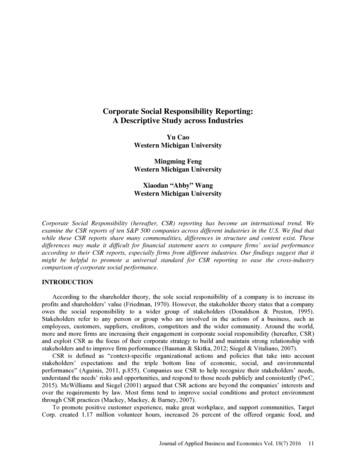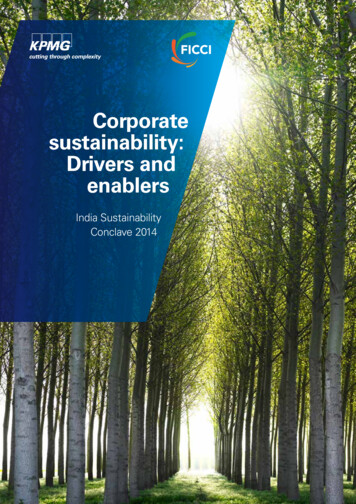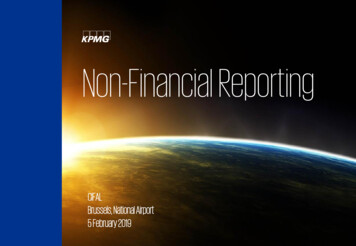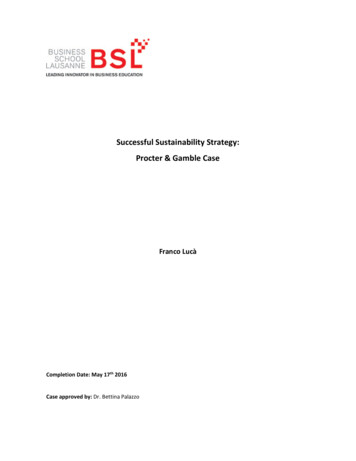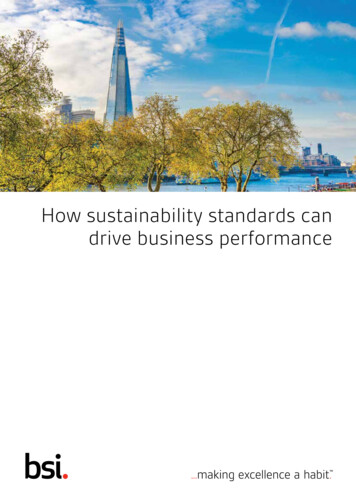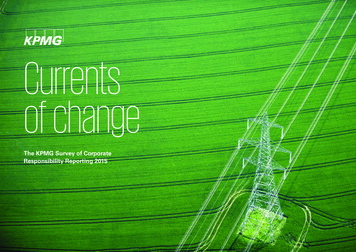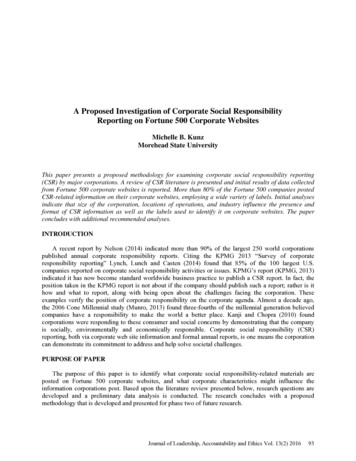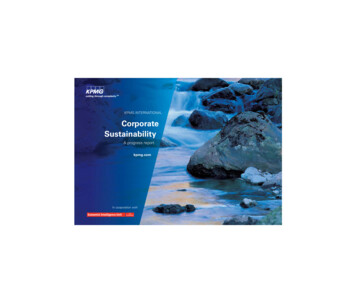
Transcription
KPMG INTERNATIONALCorporateSustainabilityA progress reportkpmg.comIn cooporation with
ContentsForeword3KPMG viewpoint5About this report12Interviewees (listed alphabetically by company):Executive summary13Introduction14 Hugh Share, Senior Global Director, Beer & Better World,Anheuser-Busch InBevThe role of government23Case Study: How FedEx, UPS and otherlogistics firms are driving new transportinnovation24Measuring and reporting27Case Study: CLP—From integratedprocesses to integrated reporting Wayne Balta, Vice President, corporate environmental affairsand product safety, IBM32Challenges ahead34 Len Sauers, Vice President for global sustainability, Proctor &GambleConclusion37Our thanks are due to all survey respondents andinterviewees for their time and insights. Jeanne Ng, Director, group environmental affairs, CLP Holdings Victoria Mills, Managing Director, corporate partnershipsprogram, Environmental Defense Fund Mitch Jackson, Vice President, environmental affairs andsustainability, FedEx Sören Buttkereit, Head, corporate sustainability external office,Siemens Bob Stoffel, Senior Vice President, engineering, strategy, supplychain distribution and sustainability, UPS (retired January 2011) 2011 KPMG International Cooperative (“KPMG International”), a Swiss entity. Member firms of the KPMG network of independent firms are affiliated with KPMG International. KPMG International provides no client services. All rights reserved.
Corporate Sustainability 3ForewordThe evidence that sustainability isbecoming a core consideration forsuccessful businesses around the worldgrows stronger every day.It is a powerful undercurrent runningthrough the pages of the business media,an almost compulsory topic of discussionat meetings of business leaders, andamong the most thoroughly researchedbusiness issues of the past decade.But translating this into action is notproving to be easy. As this survey shows,despite all the progress that has beenmade, more than a third of businessesstill do not have a sustainability strategy inplace. Of those that do, only one in three isreporting publicly on their progress.Among those that have implemented theprinciples of sustainability, enthusiasm ishigh.Nearly half of the people who took partin our survey thought that sustainablepractices would definitely improveprofitability for their companies. Onerespondent whose company has a longrunning program reported that for everydollar they are spending, they are gettingUS 1.50-2.00 back, while another toldus, with complete confidence, that “ allissues of sustainability will be solved byinnovation.”So what are the problems preventing awider take-up of sustainable practices? 2011 KPMG International Cooperative (“KPMG International”), a Swiss entity. Member firms of the KPMG network of independent firms are affiliated with KPMG International. KPMG International provides no client services. All rights reserved.
4 Corporate SustainabilityOn the evidence of our survey, they comedown to three things: The need for financing solutions thatwill allow the longer term benefits ofsustainability to compete with otherprograms with a higher short-termpayback The need for common measures,and underlying systems that producecredible information, to analyze theimpact of sustainability programs The need for a clear and rigorousinternational framework of regulationwithin which companies can plan withconfidence.The fieldwork for this study was carriedout before the United Nations FrameworkConvention on Climate Change talks inCancún, Mexico at which major effortswere made to win progress on theinternational agreements necessary forfurther adoption of sustainable practices.These initiatives need to succeed becauseit is clear from our investigations thatsustainability can be a source of innovationand growth, if governments help businessto make it so. The large amount of privatesector funds necessary to achieve climatechange goals will be released only wheninvestors are confident that governmentsare committed to making these newsystems work.We want to thank everyone who has takenpart in this research project, especially ourcolleagues at the EIU and the respondentswho gave their time to let us hear theirviews. We hope the report will be of valueto anyone with an interest in achieving agenuinely sustainable future for business.Ted Senko, Global CEO Climate Change& Sustainability and Yvo de Boer, GlobalSpecial Advisor 2011 KPMG International Cooperative (“KPMG International”), a Swiss entity. Member firms of the KPMG network of independent firms are affiliated with KPMG International. KPMG International provides no client services. All rights reserved.
Corporate Sustainability 5KPMG viewpointClearly, sustainability is rapidly becominga strategic priority for businesses. Aroundthe world and throughout this survey, wesee encouraging examples of pioneeringcompanies that have recognized theimperative of sustainability and createdstrategies and solutions to effectivelyrespond to the issue.For a growing number, the concept ofsustainability goes far beyond corporatesocial responsibility (CSR). It has becomethe strategic lens through which they viewtheir businesses. For these organizations,sustainability offers an undeniableopportunity to gain competitive advantage,drive innovation and generate real bottomline results.UPS or CLP Holdings (all of which areprofiled in the accompanying report) to seethat these market leaders are setting thepace and standard by which their peers willsoon be held accountable.What propels these organizations – anda host of others like them – past theircompetitors is the recognition thatsustainability goals must be tied tooperational strategy and measured in thesame way as other investments. And bytreating sustainability as an investmentrather than a cost, they have adjusted theirbusiness models to drive long-term changeand make them more competitive in themarket.And despite a complex array of challenges,these companies are already takinggreat strides towards shaping the globalapproach to sustainability. One needonly look at leading global brands such asProctor & Gamble, Anheuser-Busch InBev, 2011 KPMG International Cooperative (“KPMG International”), a Swiss entity. Member firms of the KPMG network of independent firms are affiliated with KPMG International. KPMG International provides no client services. All rights reserved.
6 Corporate SustainabilityOther companies, however, still seeuncertainties and complexities which stopthem from taking the initial steps required toimplement sustainability programs. For one,the lack of a clear and consistent regulatoryframework makes it difficult for companies toformulate business decisions that can havea long-term effect on sustainability. At thesame time, companies are struggling withunderstanding how to build an appropriatebusiness case for sustainability programs asthey grapple with sparse, inconsistent andoften unreliable data.An evolving regulatory environmentNotwithstanding any assumed progress onthe international stage, it is clear that moreneeds to be done to encourage businessesto embrace sustainability.For example, governments may considerdesigning regulations that provideincentives for businesses to transform.Indeed, in almost every jurisdiction,there is a real opportunity to createa stage upon which companies canachieve their sustainability goals in acommercially viable manner. Managedappropriately, governments may find thatthey can effectively deliver on their ownenvironmental targets and create a selfsufficient market for sustainability.In the meantime, many companies areassessing both the risks and opportunitiesthat are posed by regulation. At the frontend, this generally includes a mix ofregulatory compliance reviews, enterpriserisk assessments and tax exposureevaluations, and can often result 2011 KPMG International Cooperative (“KPMG International”), a Swiss entity. Member firms of the KPMG network of independent firms are affiliated with KPMG International. KPMG International provides no client services. All rights reserved.in changes that position the company tomitigate their risk and create competitiveadvantage.What gets measured gets managedOutside of regulation, many companies arefinding that their largest challenges stemfrom a lack of credible information, metricsand standards related to sustainability. Thishampers progress in several ways. Thefirst is – without meaningful benchmarks– many companies are unable to properlygauge their progress in relation to theircompetitors and market leaders. Thisgoes to the heart of good businessdecision making, and presents an issuefor all stakeholders including investors,shareholders and customers, all of whomare placing increased scrutiny on businessand product sustainability.
Corporate Sustainability 7For sustainability programs to be properlyintegrated into operational strategy,meaningful and reliable metrics mustbe developed along with the underlyingprocesses and systems to produce suchinformation. To determine long-termROI and delineate bottom-line benefits,sustainability programs must includeappropriate and relevant measurement thatleverages both financial and non-financialmetrics. Moreover, since this data will beused to evaluate overall performance, itshould be subject to the same controls thatapply to the company’s financial systemsto ensure the information is accurate andcredible.There are a number of encouraginginitiatives under way that seek to createindustry benchmarks and reportingstandards such as the Global ReportingInitiative activities and the InternationalIntegrated Reporting Committee’s work inthis area. On a related front, new auditingstandards are also under development:the International Auditing and AssuranceStandards Board released a proposed newstandard for Assurance Engagementson Greenhouse Gas Statements. Butcontinued progress and collaborationamong standard setters will be criticalto furthering the meaningful reporting ofsustainability initiatives globally.There is growing demand for the designof systems, processes, controls andgovernance frameworks that can properlymeasure and analyze sustainability metrics.And increasingly, assessments and auditsof company sustainability reports are beingconducted to provide stakeholders with aclearer view into the business’s progressand accomplishments. 2011 KPMG International Cooperative (“KPMG International”), a Swiss entity. Member firms of the KPMG network of independent firms are affiliated with KPMG International. KPMG International provides no client services. All rights reserved.
8 Corporate SustainabilityFunding business sustainability programsWhile one of the great challenges facing corporatesustainability programs lies in securing adequate longterm funding, we are seeing increasing levels of changeand innovation in this area. As organizations increasinglyview their business operations through the strategic lens ofsustainability, many will find their programs can – and should– deliver measurable returns in the long-run. As you will findin the accompanying survey, some companies are alreadyseeing returns of 50 to 100 percent on their programs; othersbelieve returns to be much higher. This will invariably lead tonew ways of thinking about financing strategic initiatives byleveraging both internal and external sources of funding.From an external standpoint, global banks, investors andfinancial institutions are putting greater focus on the impactand design of sustainability programs to gain a better snapshotof a company’s ability to assess risk, respond to change anddeliver shareholder returns. A number of asset owners andmutual funds now evaluate companies on the sophisticationand strength of their sustainability programs and include theoutcomes in their investment decisions. 2011 KPMG International Cooperative (“KPMG International”), a Swiss entity. Member firms of the KPMG network of independent firms are affiliated with KPMG International. KPMG International provides no client services. All rights reserved.
Corporate Sustainability 9Working together to achieve real change In the not-too-distant-future, it will be thosecompanies that understand and respondAs the world drives towards a state ofto the issue of sustainability by makingsustainable capitalism, much of the heavychanges to their business models andlifting will fall on the private sector. Fortaking a commercial approach to investingtheir part, governments will need to workin sustainability programs that will achievetogether to develop and deliver clear andreal and lasting benefits over the long-run.consistent rules in order to reduce thecomplexity and regulatory uncertainty ofsustainability for business.For their part, the private sector mustcontinue to lead and move ahead withboth individual programs and cooperativeinitiatives that support the creation of abroader sustainability framework. Thosethat have yet to take their sustainabilityprogram from a philanthropic CSRobjective to something substantial thatis embedded in strategy will quickly findthat – without an integrated and proactiveapproach to sustainability – they will rapidlylose ground to their competitors. 2011 KPMG International Cooperative (“KPMG International”), a Swiss entity. Member firms of the KPMG network of independent firms are affiliated with KPMG International. KPMG International provides no client services. All rights reserved.
10 Corporate SustainabilityLooking Ahead“I believe the private sector has the power to make a massive impact on globalsustainability goals,” said Yvo de Boer, KPMG s Special Global Advisor on ClimateChange and Sustainability and Former Executive Secretary, United Nations FrameworkConvention on Climate Change. “But empowering them to do so will require supportivepolicy and actions on the part of the world s governments. As we look ahead to Durban,we call on policy makers to deliver a strong, clear and unified vision for the future ofcarbon pricing and regulation, and – in such a way – provide the consistent frameworkbusinesses need in order to commit to robust sustainability programs.”1The 17th Conference of Parties (COP-17) of the United NationsFramework Convention on Climate Change will be held in Durban,South Africa, November 28 – December 9, 2011 2011 KPMG International Cooperative (“KPMG International”), a Swiss entity. Member firms of the KPMG network of independent firms are affiliated with KPMG International. KPMG International provides no client services. All rights reserved.
2011 KPMG International Cooperative (“KPMG International”), a Swiss entity. Member firms of the KPMG network of independent firms are affiliated with KPMG International. KPMG International provides no client services. All rights reserved.
12 Corporate SustainabilityAbout this reportCorporate Sustainability: A progress report is a KPMG research paper, conducted in cooperation withthe Economist Intelligence Unit. It reviews the importance of sustainability within business today andexecutive attitudes toward this issue.For the purposes of this report, corporate sustainabilityis defined as: “adopting business strategies thatmeet the needs of the enterprise and its stakeholderstoday while sustaining the resources, both human andnatural, that will be needed in the future.”The survey was conducted in October 2010.Chart 1Survey has global perspective(% of respondents located in each region)The report is based on the following inputs: A global survey of 378 senior executives,encompassing a range of industries, and evenlysplit among North America (US and Canada), AsiaPacific and Europe, with a smaller representationfrom the Middle East, Africa, and Latin America.Organizations of all sizes were represented:40 percent of respondents worked for firmswith revenues of at least US 1 billion, whereas47 percent were from firms with revenues ofUS 500 million or less. The respondent base wasvery senior: 26 percent were CEOs, presidents ormanaging directors of their firms; half representedthe C-suite or board; and all respondents were in amanagement position.North America11%Europe29%28%Asia Pacif icRest of World32%Source: Economist IntelligenceUnit survey, October 2010 To complement this, and provide specific context,the Economist Intelligence Unit conductedextensive desk research and in-depth interviewswith numerous corporate sustainabilityexecutives and experts. 2011 KPMG International Cooperative (“KPMG International”), a Swiss entity. Member firms of the KPMG network of independent firms are affiliated with KPMG International. KPMG International provides no client services. All rights reserved.
Corporate Sustainability 13Executive summaryThis report examines the impact ofsustainability on business practices, therole that government is playing, howfirms are reporting on this issue andthe challenges ahead. Some of its keyfindings include:key rationale. The primary focus is onthe environmental side, in particularwith regard to resource and energyefficiency. Sustainability is being viewedas a source of innovation—andnew growth. Forty-four percent ofexecutives agree sustainability is asource of innovation, and 39 percentsee it as a source of new businessopportunities. Far fewer disagree. Sustainability has moved up thecorporate agenda over the past threeyears. Sixty-two percent of companiessurveyed have a strategy for corporatesustainability, up from just over halfin February 2008, despite the tough Firms are increasingly measuring—economic environment that has madeand reporting—their sustainabilitymany organizations focus on goals withperformance. Just over one out ofimmediate impact. Just 5 percent havethree (36 percent) companies polledno plans to create such a strategy, whilehave issued at least one public report onremaining firms are in the process ofsustainability, and another 19 percentdeveloping such a plan.plan to do so soon—although a sizeable Sustainability’s main drivers areminority (38 percent) have no plans tochanging. Although regulatorydo so. Two key challenges on this frontrequirements, brand enhancement andinclude generating relevant data andrisk management remain key drivers ofestablishing relevant benchmarks.sustainability, cost reduction is also a Business wants a successor to theKyoto Protocol. Two-thirds (67 percent)of executives believe a new set of rulesto replace those that will end in 2012is “very important” or “critical”. Just 8percent think it is “not important”. Thefield of sustainability is unusual in thatcorporate lobbying is weighted towardtighter rules, even though this mayresult in higher costs. 2011 KPMG International Cooperative (“KPMG International”), a Swiss entity. Member firms of the KPMG network of independent firms are affiliated with KPMG International. KPMG International provides no client services. All rights reserved.
14 Corporate SustainabilityIntroduction—Sustainability’s corporate evolution“No one can resist an ideawhose time has come.”Victor Hugo’s quote could well beapplied to corporate sustainability at thedawn of 2011. Companies around theworld remain committed to pursuingsustainability agendas, despite a numberof factors: a severe economic downturnin many regions, high unemployment, adisappointing outcome from the 2009Copenhagen climate change meeting andsomewhat lower energy prices.Indeed, the proportion of firms with asustainability strategy has edged up to62 percent, from just over half in a similarsurvey conducted by the EconomistIntelligence Unit in early 2008. This risewas by no means a foregone conclusion afew years ago, but illustrates how the ideahas caught hold within business.Senior executives interviewed for thecurrent report often cited the depth ofengagement with the issue as the mostsurprising thing about their organization’ssustainability policies. German industrialconglomerate Siemens, for example, nowregards sustainability “not as a compliancetopic, but as a strategy topic,” saysSören Buttkereit, Head of the company’scorporate sustainability external office.It is worth noting, though, that this uptakeis more common among larger, publiclylisted firms, which are far more likely tohave developed a corporate sustainabilitystrategy (79 percent of those polled haveone) than their smaller, privately heldcounterparts (49 percent). It can also besector-specific: among consumer goodsfirms, for example, as many as eight in tencompanies have developed a sustainabilitystrategy. 2011 KPMG International Cooperative (“KPMG International”), a Swiss entity. Member firms of the KPMG network of independent firms are affiliated with KPMG International. KPMG International provides no client services. All rights reserved.
Corporate Sustainability 15Sustainability moves into the mainstreamNevertheless, uptake is widespread: only5 percent of survey respondents say theircompany does not need a sustainabilitystrategy, while most of the remaining firmswithout such a plan are busy developingone, or intend to have one soon.As sustainability has moved into themainstream, firms have worked to widenand deepen their efforts.Chart 2Although sustainability encompasses abroad range of issues, much work hascentered on the environment—dealingwith pollutants and greenhouse gaseswhile improving efficiency in the use ofphysical inputs. And while the need anddesire to do the right thing is often cited astheir primary motivation, organizations areincreasingly finding economic drivers forsuch actions.Larger companies are more likely to have corporate sustainability strategies(% of respondents who say their companies have an all-encompassing strategy for corporate sustainability)Private companies withrevenues less thanUS 500 million49%Public companies withrevenues overUS 1 billion79%Source: Economist Intelligence Unit survey, October 2010 2011 KPMG International Cooperative (“KPMG International”), a Swiss entity. Member firms of the KPMG network of independent firms are affiliated with KPMG International. KPMG International provides no client services. All rights reserved.
16 Corporate SustainabilitySustainability boosts bottom lineIn a 2008 study, only 31 percent ofrespondents said the biggest benefitof adopting sustainability would beincreased profitability; today, 48 percentof executives believe implementingsustainability strategies would boost thebottom line in some way, either by cuttingcosts (27 percent) or increasing profitability(21 percent). The benefits often flow tothe bottom line, as the search for newefficiencies cuts costs. But they also canboost revenues by creating markets fornew products and services. In both cases,sustainability strategies are triggeringpromising innovations.These efforts are driving other changes.First, the need to measure such actions isgiving rise to more internal monitoring and,as a result, external reporting.Second, sustainability-related metricsand objectives are being applied morefrequently to new investment and projectrelated decisions, and thus reshaping,to some degree, how some of thesedecisions are made.For the passionate advocates ofsustainability, all this is good news, buttheir work is far from finished. Mostorganizations are still at an early stage inimplementing sustainability. Relevant skillsand experience are in short supply. Manyfirms are grappling with the problem ofdeciding exactly what and how to measure,and appropriate benchmarks are scarce.The macroeconomic environment remainschallenging, making it difficult to obtainapproval for larger capital investments.And existing government policies—forexample, long-standing subsidies for 2011 KPMG International Cooperative (“KPMG International”), a Swiss entity. Member firms of the KPMG network of independent firms are affiliated with KPMG International. KPMG International provides no client services. All rights reserved.some types of energy—still undercutthe economic viability of some newertechnologies. Also, energy prices couldwell remain relatively flat in the mediumterm, thus somewhat weakening a keymotivation to adopt energy-saving policies.In the long run, however, prices seem sureto increase.Finally, the global regulatory environmentremains fractured and uncertain, despite amajority of firms that are actually in favor ofclear—including tighter—rules.This report explores each of these trends.It argues that sustainability can be seenas a source of innovation and growth,especially if government helps. It outlinesthe challenges faced in measuring andreporting. Finally, it assesses the keyhurdles still to overcome.
Corporate Sustainability 17Where to next? Sustainability as a source of innovation and growthOver the past decade, the issue ofsustainability has steadily gained greaterprominence on the corporate agenda.Numerous factors have contributed to this,particularly a widening array of laws andregulations (cited by 42 percent of surveyrespondents) and a desire to enhancebrand reputations (41 percent). Otherdrivers include concerns about managingrisks associated with sustainabilityissues (29 percent) and an interest in costreduction (27 percent).Already, basic engagement is widespread:about seven in ten companies polled forthis report have undertaken an array ofsustainability-related activities over thepast year—and will continue to do so.These typically include improving energyefficiency (72 percent); reducing products’environmental footprint (69 percent); andcutting either emissions or pollutants(67 percent). Executives interviewed forthis report describe a wide range of suchactions.Chart 3Companies engage in a variety of sustainability activities(% of respondents who say their companies have takenthese actions in the last 12 months)72%Improving energy ef f iciencyReducing products' environmentalf ootprint69%67%Cutting emissions or pollutantsImproving environment aroundf acilitiesEnhancing impact on localcommunities65%61%Source: Economist Intelligence Unit survey, October 2010 2020111 KPMG International CooperativCooperativee (“KPMG International”), a SSwisswiss entitentityy. Member fifirmsrms of the KPMG netnetwwork of independent fifirmsrms are afaffifiliated with KPMG International. KPMG International proprovidesvides no client serservices.vices. All rights reserreservved.
18 Corporate SustainabilityCommitment to tough goalsThis highlights the fact that businesses’ engagementwith sustainability has, in general, deepened in recentyears, especially in the environmental realm. Many firmsare committing themselves to tough goals, even withoutregulatory mandates, in part because they believe suchrules will come at some point. Proctor & Gamble (P&G),with global revenues of US 78.9 billion in fiscal 2010, is aprime example. In late 2010 it set out a range of long-termtargets for transforming its business, ranging from poweringits plants solely with renewable energy to ensuring zeroconsumer and manufacturing waste goes to landfill. It hasset a series of goals for 2020, such as using 30 percentrenewable energy and reducing packaging by 20 percent.This comes even as the firm works to extend its reach to fivebillion consumers, from the 4.2 billion it currently serves.“All issues of sustainability will besolved by innovation.”Len Sauers, Vice President for globalsustainability, Proctor & Gamble 2011 KPMG International Cooperative (“KPMG International”), a Swiss entity. Member firms of the KPMG network of independent firms are affiliated with KPMG International. KPMG International provides no client services. All rights reserved.
Corporate Sustainability 19Delivering on such targets will requireinnovation, in terms of both processesand technology.Increased internal efficiencyHugh Share, Senior Global Director forthe firm’s Beer & Better World program,says its internal efficiency system helps“All issues of sustainability will be solvedby innovation, I have no doubt in my mind,” create more efficient brewing operationsby standardizing processes worldwide. Itssays Len Sauers, P&G’s Vice Presidentfor global sustainability. Executives polledmost efficient brewery, in Cartersville, GA,uses 3.06 hectoliters of water for everyfor this report generally agree: 44 percentthink sustainability is a source of innovation hectoliter of beer produced, comparedin their firms; just 18 percent disagree.with a company-wide average of 4.3Such innovation is often focused on simple hectoliters in 2009. Those lessons havehelped a company plant in Ningbo, China,efficiency. Brewer Anheuser-Busch InBev(AB InBev), for example, focuses on cutting cut its equivalent rate to 3.5 hectoliters,its water and energy use, while increasing the brewer’s target level for all of its plantsby 2012. It did so by implementing variousrecycling within its facilities. The firm,innovations, including narrower nozzlewhich had revenues of US 36.8 billion indiameters on bottle-washing machines.2009 and holds a global market share of“We have a very strong culture aroundnearly 25 percent, is working to cut wateruse by 30 percent by 2012 compared withbusiness performance in every area and so2007 levels, among other goals.I see that as something that is just going todrive efficiency in our operations in manydifferent areas, of which sustainability isone,” says Mr. Share. 2011 KPMG International Cooperative (“KPMG International”), a Swiss entity. Member firms of the KPMG network of independent firms are affiliated with KPMG International. KPMG International provides no client services. All rights reserved.
20 Corporate SustainabilityLogistics industryAlternative technology and fuelsSustainability economics is spreadingThe logistics industry is another example.With the huge volume of goods deliveredeach day, even tiny efficiency gains cantranslate into significant savings. Take UPS,which operates a fleet of some 100,000vehicles across more than 200 countries,delivering an average of 15 million packageseach day t
KPMG INTERNATIONAL Corporate Sustainability A progress report kpmg.com In cooporation with . Contents . corporate sustainability external office, Siemens Bob Stoffel, Senior Vice President, engineering, strategy, supply . sustainability goes far beyond corporate social responsibility
